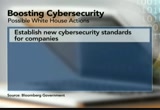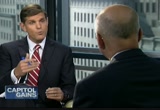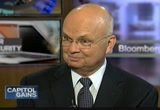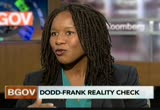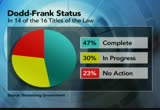tv Meet the Presss Press Pass NBC September 30, 2012 11:30am-11:45am EDT
11:30 am
. >> this week on bloomberg government's "capitol gains," it is the national security fight america may be losing, cyber tax poses a clear and present danger, but congress cannot agree on how to bolster the digital defenses. we'll talk about the implications for business. former cia director. michael hays. it was hailed as the biggest overhaul of wall street rules begins the great depression. more than two years later, dangers remain. we'll have an exclusive bloomberg government analysis where the law really stands. and meet the woman leading the defense industry's battle to block sweeping automatic budget cuts. you need to know marianne blake. >> peter: i'm peter cook.
11:31 am
welcome to capitol gains, stay with us for the next half hour. bloomberg government focused on the government impact of businesses and the economy. its exclusive research and analysis you cannot find anywhere else. this week, the debate over what needs to be done to bolster the country's defenses against cyber attack. this week, wells fargo found their banks under attack. the suspect iran. they deny it. but republicans and democrats left town without coming to a deal on this. now they think the president may act on its own. an exclusive bloomberg analysis examines the options. they include telling authorities to establish new
11:32 am
cyber standards for utilities, pipelines to banks. creating a realtime system to monitor private threats. that means connecting private companies to government networks. and they may ease limits on sharing information between government and the private sector which is raising privacy concerns. joining me now is someone that knows the debate over how to defend against this. general michael hayden. he is now a principal with a security firm in washington. thank you for joining us. >> yes. >> peter: how prepared is the country for the cyber threats of today? >> not as well prepared as we need to be. my successor at the national security agency, general alexander was asked a similar question. he said on a scale of 0 to 10 we are at three. that should not be comforting for anyone in terms of the real and present danger that exists out there in the cyber domain.
11:33 am
>> peter: we talked about the fact congress left town route without -- without resolving the debate. is that irresponsible? >> i'm not in a position to judge congress. i will comment that one of the reasons they were unable to arrive at a consensus is that we, the nation, we have not yet arrived at a consensus. the question i ask, the dilemma i pose is that we as citizens have not determined in broad terms what we want the government to do in this cyber domain to defend us or what we will allow the government to do. the most prominent bill up there in the sent at had the remarkable history of being equally on posed by the american chamber of commerce and the american civil liberties union. it gives you a sense we have not settled on big ideas yet. >> peter: let me ask you about the possibility the president can step in here through executive action.
11:34 am
if you were advising the president today would you recommend the wise house step in and if so, what should they do and what can they do? >> that is a close call. we do need some momentum. there are those of us that are watching the activity on the hill are suggesting there is some common ground. we need to generate momentum for the future. the executive order does that, and frankly, that's probably a good thing. but it is a limited thing. it comes with a tariff. acids before, the problem right now is we lack political concensus. an executive order is an admission we lack political consensus but we are going to move forward anyway. even if these are correct steps we are moving forward in a sensitive area without the two political branches of government being in agreement. as director of nsa and cia, i
11:35 am
operated on the outer reaches of executive prerogative doing things to defend the nation. you cannot do that over the long-term in a democracy without broad political support. i fear moving forward we are moving without the support. >> peter: what about business support? they are fighting this idea of more regulation, more requirements on the business community. the companies out there that operate the critical infrastructure what is your message to them? >> honest men can differ with the role of the government and who gets to regulate. honest men cannot differ over the need for standards. we have to agree on a certain level of security. because peter, here is the issue. each industry makes these decisions based upon a very logical cost/benefit analysis for the industry. but there are some industries when they are penetrated and punished in a cyber attack, the cost is not confined to these industries. it is a much broader cost.
11:36 am
it is spread across the broader society. industry has to reflect the real cost of a cyber fail failure, not just the narrowly defined costs. >> peter: final question. mandatory standards or voluntarily? >> there has to be standards, mandatory standards is the easy answer, it sets a high bar everyone has to get to. the problem with mandatory standards in this domain is it changes so quickly, how do standards keep up. and i fear if we rely only on mandatory standards and not voluntary, we set in motion a compliance mind set which is where you do not want to be here. you want to be aggressively developing the defenses, not simply checking squares imposed on you by and outside body. >> peter: general hayden, thank you. i appreciate the time. difficult debate here in washington, appreciate it. when we return here on "capitol gains," it has been two years
11:37 am
11:39 am
. >> peter: you are watching bloomberg government's capitol gains, i'm peter cook. the sweeping overall of wall street rules in a generation, two years after it became the law of the land, dodd frank is a focus of intense debate. >> the law created a new cop on the beat. the consumer protection bureau, policing everything from auto loans to house loans. for the first time the
11:40 am
government has oversight over the $648 trillion market. when a financial firm threatens to inflict damage, the government can step in and manage it. these too big to fail banks have new rules and a ban against playing the market casino with their own funds. five former secretaries of the treasury endorsed this rule but it is not in place as lobbying to weaken it continues. dodd frank is far from done. mortgage reforms is unfinished. the credit rating industries are operating under the same old rules and more than four years after aig's bailout a committee of all the major federal regulators still needs to designate other nonbanks that cause risk and merit tough scrutiny. it is a club nobody wants to join. >> peter: for more on the continuing battle over financial rules and what is left to do, i'm joined by bloomberg government's senior
11:41 am
economic analyst nila richardson and katie north. you spent a lot of time tracking this. where do we stand with dodd frank? how much is done? >> excluding the housing reform and many of the consumer financial protection bureau issues we are halfway -- almost to the halfway point on implementing this. 20% has not been introduced yet. we've seen in our analysis at bloomberg government really it has to do with financial stability issues. if you ask me what that means, that means looking at the rule, looking at areas where the providing cushions and safeguards for banks through capitol requirements and a few of the other requirements that are meant to provide safeguards. >> peter: one of the big ticket items is the mortgage reform. the housing crisis started this in the first place. what is coming in the area of mortgage reform. everyone is talking about a
11:42 am
qualified residential mortgage. what is that? why should we care? >> dodd frank says banks to set standards in the primary market and the secondary market, where banks take all the mortgages, pool them together, and sell to investors. what it means for people looking to buy homes is that we can expect it will be a lot harder to get a mortgage. we are talking about maybe 20% down, just to enter into the market for a qualified mortgage. and really high fico scores. these rules are being promulgated under dodd frank and wim determine what gets originated and how big a role the government plays in taking up the slack for all the people who won't qualify for these standard mortgage products. >> peter: you want to be within the standard club? >> yes. otherwise the government will have a big role in serving the underserved borrowers. a lot of middle class homeowners will not be able to afford the 20% down.
11:43 am
>> peter: you talked about the volkar rule as well. that is the most talked about provision. where does that stand right now? so much lobbying around it? will it be the watered down version that wall street wants or the tougher version many lawmakers do? >> it is meant to limit risk within the financial system. we saw with the financial crisis this was a huge issue. after the j.p. morgan scandal, it came back front and center in terms of what congress focused on as well as the regulators. five distincter banking regulators have to work on this. they are having difficulty coming to terms with how to write it in the end. and so what we are seeing is that potentially it can be something that regulators are willing to work with the banks on. they want it to be something easy to implement and enforce but at the same time you are wrestling with all the concerns that you need to limit the risks to the financial system and make sure that market- making is okay and underwriting is okay and hedging is okay.
11:44 am
>> peter: and the reality is that we have regulators here racing the clock. yes, the president may win, but some of these folks may not be leaving their post at the end of the first term. they are trying to get it done. >> absolutely. there are a lot of ways that you can water down dodd frank. if you are against the regulation, if you think it is an overreach by the government, for one, you can starve the funding of the agencies that are charged to make these. >> peter: something republicans tried to do. >> absolutely. secondly, you can challenge the economic analysis they use to come up with the rules. we're seeing this is being done in the court system successfully by the industry groups. and third you can replace the leaders of the regulation bodies and that is another way to limit the amount of enforcement cases that are brought up under dodd frank. so the regulators have a lot to do in a short time to do it. >> peter: thanks to both of you. i know we'll talk about this again. still
128 Views
IN COLLECTIONS
WRC (NBC) Television Archive
Television Archive  Television Archive News Search Service
Television Archive News Search Service 
Uploaded by TV Archive on

 Live Music Archive
Live Music Archive Librivox Free Audio
Librivox Free Audio Metropolitan Museum
Metropolitan Museum Cleveland Museum of Art
Cleveland Museum of Art Internet Arcade
Internet Arcade Console Living Room
Console Living Room Books to Borrow
Books to Borrow Open Library
Open Library TV News
TV News Understanding 9/11
Understanding 9/11
